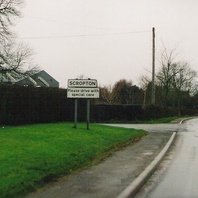
Viking Names
Scropton
Scropton, in the Appletree Hundred of Derbyshire, comes from the Old Norse male personal name Skropi and the Old English tun ‘farm, settlement’. It is thus a hybrid name. It is a joint parish with Foston.
Read More
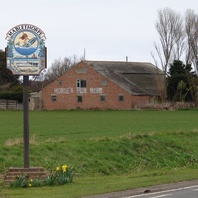
Viking Names
Mablethorpe
Marblethorpe, in the Calceworth Wapentake of Lincolnshire, comes from a likely Continental Germanic male personal name Malbert and Old Norse þorp ‘a secondary settlement, a dependent outlying farmstead or hamlet’.
Read More
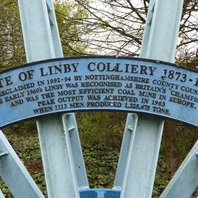
Viking Names
Linby
Linby, in the Broxtow Wapentake of Nottinghamshire, comes from Old Norse lind ‘a lime tree’ and by ‘a farmstead, a village’.
Read More

Viking Names
Gunngifu
Gunngifu is a postulated Anglo-Scandinavian hybrid female personal name formed from the very common Old Norse element Gunn- from gunnr, guðr ‘battle’ combined with the Old English element gifu ‘gift’. There is a possible attestation of the name in a medieval document from Lincolnshire.
Read More

Viking Names
Scartho
Scartho, in the Bradley Wapentake of Lincolnshire, is a difficult name. The second element is clearly Old Norse haugr ‘a hill, a mound’. The first element, however, has been the subject of much discussion. It has been suggested that the first element is the Old Norse male personal name Skarði or the Old Norse element skarð ‘an opening, an open place in the edge of something, a gap, a mountain pass’. Since the area is now built up, it is nearly impossible to determine the exact topography of the place. It may be pointed out that there are patches of glacial sand and gravel and alluvium at the top of the hill. It has also been suggested based on forms of the name in Scarf- that the first element is Old Norse skarfr ‘a cormorant’, but these spellings occur in only one source. On balance, skarð provide an acceptable first element, but twentieth-century development makes certainty impossible.
Read More

Viking Names
Willoughby Waterleys
Willoughby Waterleys, in the Guthlaxton Hundred of Leicestershire, is an Anglo-Scandinavian compound from Anglian wilig ‘a willow-tree’ and Old Norse by ‘a farmstead, a village’. This is a common hybrid place-name and in most cases of usage it is a Scandinavianized form of Old English wiligtun ‘farmsted or village where the willows grow’. Some names of this type may conceal the Old English wiliga-beag ‘a circle of willow-trees’. Willoughby is a well-watered parish and lies on gravel and clay between two arms of the Whetstone Brook and has many large pools in its vicinity. Therefore its affix Waterleys from Old English leah ‘a forest, wood, glade, clearing; (later) a pasture, meadow’ and Old English wæter (Old English) ‘water, a river, a lake’ is appropriate. The affix was likely added at a later date to distinguish this Willoughby from Willoughby on the Wolds just beyond the Nottinghamshire boundary to the north.
Read More
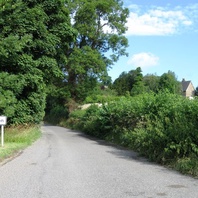
Viking Names
Kirk Ireton
The first element of Kirk Ireton, in the Wirksworth Hundred of Derbyshire, is the genitive singular or plural of the Old Norse ethnonym Íri, ‘an Irishman; probably also a Norseman who had lived in Ireland’ combined with the Old English element tun ‘an enclosure; a farmstead; a village; an estate’. Old Norse kirkja ‘a church’ was affixed at a later date. Traditionally, the place-name has been interpreted as referring to a settlement of Irishmen; probably Norsemen who lived in Ireland. However, the exact implications of such a name are not yet fully understood and are the subject of ongoing work by Dr Jayne Carroll of the Institute for Name-Studies, University of Nottingham.
Read More

Viking Names
Toki
Tóki is either a short form of names in Þórkell or possibly a pet-form of name in Þór- ‘the god’s name Þórr’ with the addition of the suffix -ki. The name is very common in Denmark where it is found in many place-names. It possibly spread to Norway and Sweden from Denmark. It is fairly common in Sweden in the forms Toke and Tuke and in Norway from the eleventh century onwards, but it is very rare in Iceland. In Normandy it is probably found as the surname Tocque and occurs in a number of place-names there. The personal name is also the first element in Tugby, Leicestershire.
Read More
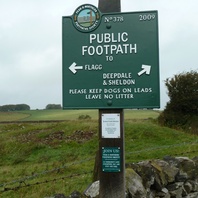
Viking Names
Flagg
Flagg, in the High Peak Hundred of Derbyshire, is a simplex place-name perhaps from the dative plural form (-um) of Old Norse flag ‘a turf, a sod’ with the meaning ‘place where the turfs were cut’.
Read More
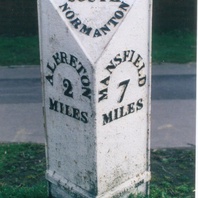
Viking Names
South Normanton
South Normanton, in the Scarsdale Hundred of Derbyshire, takes its name from the Old English ethnonym Norðman ‘Northman, Norwegian’ and the Old English element tun ‘farm, settlement’. There are several places of this name, predominantly in the East Midlands: five in Nottinghamshire, also others in Derbyshire, Leicestershire, Lincolnshire and Rutland, and one in the West Riding of Yorkshire. The prefix South distinguishes it from Temple Normanton, formally North Normanton. Traditionally, the place-name has been interpreted as referring to a settlement of Norwegians (in an area where most of the Scandinavian settlers were Danes). However, the exact implications of such a name are not yet fully understood and are the subject of ongoing work by Dr Jayne Carroll of the Institute for Name-Studies, University of Nottingham.
Read More
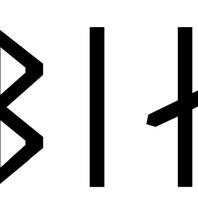
Viking Names
Asbjorn
Ásbjǫrn was a common name in Norway from the time of the settlement of Iceland (c. 870-930) onwards, and is common in Swedish and Danish runic inscriptions. Forms in Æs- are very common in Denmark and a few runic forms likely represent these spellings. Additionally there are numerous instances of the form Osbern found in Normandy which are possibly loans from England. It is a Old Norse compound name with the first element, Ás-, from Old Norse ás, óss ‘a god’, combined with bjǫrn, ‘bear’. It was common for Viking Age Scandinavian personal names to use animals as name-forming elements. Several place-names in Lincolnshire and Yorkshire may include the Low German male personal name Osbern, although the name is more likely to be an anglicised form of Old Norse Ásbjǫrn, as in Osbournby in Lincolnshire, and the name is also recorded in medieval documents from both Lincolnshire and Yorkshire.
